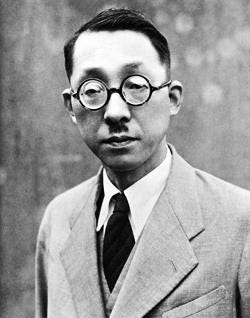
A lifetime of misery can come from chasing the wrong kind of happiness
Without thinking too much about it, answer this question: what is the end goal of your life? All of the accomplishments, relationships, and possessions you may be chasing right now — why are you chasing them? What is it that they promise you, that makes you want them?
More likely than not, the answer is happiness. The external things we chase seem like they will make us happy. We struggle and sacrifice, plan and prioritize, all so that we can get those things that will supposedly make us happy.
But is that really how it works? How is it that we find happiness? And what exactly is happiness, anyway?

Jōsei Toda and Relative vs. Absolute Happiness
Jōsei Toda was a teacher and activist in Japan during one of the most devastating times of that country’s history. He is probably best known as one of the founders of Soka Gakkai, a lay Buddhist organization formed in 1930 — which has becomes one of Japan’s largest religious organizations.
Along with his mentor, Tsunesaburo Makiguchi, he believed that the ultimate end of human existence is happiness. Any undertaking — whether education, entrepreneurship, or religion — should have the goal of making people happy.
But there is a catch. Toda was quick to point out that we are often confused about what happiness is, and that this confusion was actually at the root of a great deal of unhappiness. We often chase things that we think will make us happy, but in turn we make everyone — including (eventually) ourselves — miserable. To help explain why this is, Toda made the distinction between two kinds of happiness: relative happiness and absolute happiness. It is by chasing the former — when we should be chasing the latter — that we short-change ourselves, and sometimes others.
According to Toda, relative happiness describes the more common, but also more transient concept of happiness. It’s the one that we look for outside of ourselves — in people, things, accomplishments, and so on. Though it’s easier to attain, it’s also ultimately not sustainable. It doesn’t last, and we find ourselves craving more.
Absolute happiness describes a kind of happiness or sustained joy that you find within yourself. It doesn’t rely on people, places, things, or goals — and so it is stable through the flux of life. Unlike relative happiness, it doesn’t fade due to circumstances, and it makes both your life and the lives of others richer. It’s absolute happiness that we should be chasing, and actually, that’s the great thing about it: we don’t have to chase it at all.
Relative Happiness
So much of how we feel depends on circumstances. If things are going our way we feel good; if not, we usually don’t. We may set goals, begin projects, and browse for new gadgets Amazon, all with the implicit belief that whatever we accomplish or purchase will contribute to our happiness. But this is what Toda calls “relative happiness.”
Relative happiness speaks of a condition in which one’s material desires or immediate personal wishes are satisfied. While there is no limit to what we can hope or wish for, there is always a limit to what we can have materially and how long we can hold on to it.
Whatever we accomplish or acquire, it is subject to loss, degradation, or simply our own loss of interest and enthusiasm. It is well known that we as humans are subject to what’s called hedonic adaptation — the phenomenon whereby we become used to some new wave of happiness, and suddenly demand more. We get a new thing, get giddy about it, get used to that giddiness, and get hungry for another hit. Wash, rinse, repeat.
This adaptation happens in part because the source of that good feeling is outside of us. It is relative to what we have, what we’re doing, or who we’re with. Because it’s relative, it simply doesn’t last. And because it doesn’t last, it’s not the type of happiness we should be chasing.
Absolute Happiness
A happiness based on external circumstances is fleeting and unreliable. But the kind of happiness that comes from within — the kind you can feel even while you sit cramped on a smelly, crowded bus, or while you scrub kitchen floors on your aching knees— is absolute happiness. Toda explains it quite well:
…absolute happiness means that living itself is happiness; being alive is a joy, no matter where we are or what our circumstances. It describes a life condition in which happiness wells forth from within. It is called absolute because it is not influenced by external conditions.
Absolute happiness doesn’t grasp for anything, it’s not conditional upon anything happening; it just is. In a way, absolute happiness comes when you actually give up striving to obtain happiness. The striving for happiness itself gets in the way of happiness, because it’s there in us already. It’s deep down, covered by the thorny shrubbery of desire, jealousy, anger, and negative self-talk. But it’s there.
The striving for happiness itself gets in the way of happiness, because it’s there in us already. It’s deep down, covered by the thorny shrubbery of desire, jealousy, anger, and negative self-talk. But it’s there.
Tapping Into Absolute Happiness
Realizing absolute happiness comes from slowing down the ever-grasping mind, and cutting away the numerous attachments (e.g., “if I had this, I’d be happy; if this happened, I’d be happy”). It comes when your mind stops reaching and starts settling — as in, coming to rest. It comes when you realize that even if you don’t achieve anything else, you are alive right now, and you have the ability to — by a simple act of your own will — take a deep breath.
You can live in this moment. You can sit here, and observe and divide this moment into an infinite amount of tinier moments — each bursting with all kinds of sensations and thoughts that you weren’t even aware of before. You can observe the truly overwhelming wonder of your own mind just being. That’s where absolute happiness grows.
You don’t need to meditate to do this. You can do thousands of different things, from making a sandwich to driving to work, and you can realize and tap into this. It’s there for you, but you’ve allowed it to be buried. You need not add anything to your life to find it. You simply need to take away all the things that have blocked your way. It’s work, but you already have all you need to do that work.
If this sounds crazy and spiritual, that’s probably because it is. Maybe you have another name for it, rather than spirituality— so use that. The point is, there is this latent ability within each of us to stop and peel back a myriad things that have grown over our sense of happiness.
We need not add anything to our lives in order to be happy. We can be happy now, and strive for whatever it is we want while already happy. To me, that sounds much better than the alternative. Don’t you think?
